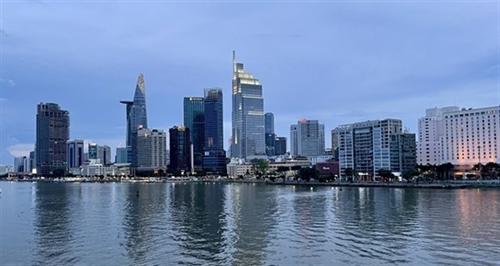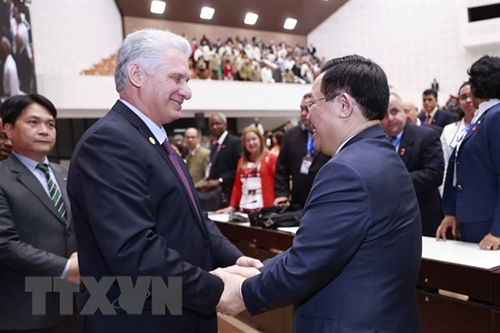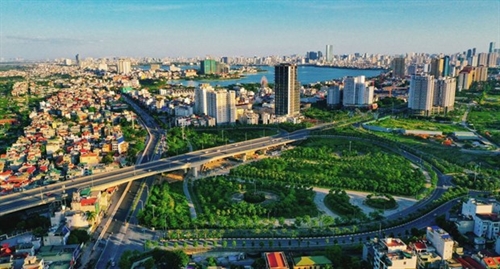Drastic measures are needed for Ho Chi Minh City - the country’s largest economic hub - to address a series of problems in a bid to speed up recovery, experts have said.
The real estate market has faced unprecedented problems with a large inventory and a sharp drop in liquidity since the middle of last year, said Dr. Nguyen Van Dinh, Vice Chairman of the Vietnam Real Estate Association.
Apartment prices in the city plummeted by 40-50 percent year-on-year in the last quarter of 2022, while sales declined by 30 percent year-on-year, according to property services company Cushman & Wakefield.
The market has seen a huge imbalance between supply and demand for years, with an oversupply in the high-end segment but a shortage of affordable housing products, according to Dinh.
Though real estate accounts for only 3.7 percent of the city’s GRDP, the sector has organic relationships with many other fields and creates a large number of jobs.
In addition, the slow disbursement of public spending remains a problem, which has caused many key projects in the city to be delayed for years.
The city disbursed only 4 percent of public investment in the first quarter, out of a total 55.2 trillion VND worth of public investment set for the year.
Speaking at a recent meeting, Nguyen Van Nen, Secretary of the municipal Party Committee, said the city’s economic recovery would face challenges with stagnant property and bond markets, and declining industrial production for the rest of 2023.
 |
| A view of HCM City’s skyline seen from Thu Thiem Peninsula in Thu Duc city of HCM City__Photo: VNS/VLLF |
It has put in doubt whether the city will achieve its yearly growth target.
The city’s GRDP reached VND 360 trillion (USD 15.4 billion) in the first quarter, up 0.7 percent year-on-year, according to a report by the city’s Statistics Office.
Its growth was lower than the national average, ranking 56th out of all 63 cities and provinces across the nation, said the report.
Its total retail sales of goods and services increased by only 5 percent year-on-year in the first quarter, while its exports reached more than USD 10 billion, a drop of 17 percent year-by-year, the deepest decline in more than two decades.
Nguyen Phuoc Hung, Vice Chairman of the HCM City Union of Business Associations (HUBA), said there has been a steady decrease in exports in most industries, including garments, agriculture, forestry, fishery and wood processing, and others.
Businesses are facing an unprecedented year in exports, he said.
Garment exports fell 8 percent, and handicraft and woodwork exports decreased by about 15 percent, he added.
He attributed the low exports to a lack of export orders from major global markets, low cash flows and an inability to borrow from banks, he added.
Stagnant credit growth
Credit growth in HCM City increased by only 0.3 percent in the first quarter, according to figures from the central bank.
Since last September, deposit interest rates at banks have continuously surged to as much as 12 percent per year, pushing lending interest rates up to 15-16 percent a year.
Pham Quang Anh, Director of Dony Garment Company, said it was challenging to access loans for businesses.
While the central bank has consistently called on credit institutions to cut lending rates to support businesses, getting loans disbursed has remained a burden for them, he said.
Many firms, especially SMEs, need funds to tackle cash flow issues or to develop growth strategies, he added.
Several businesses said that they have been rejected by banks even though they have collateral and a good credit score.
Other firms said they were facing difficulties in acquiring new loans, with banks only agreeing to lend the amount that they have repaid on current loans.
Companies with week finance contingency plans or without collateral are finding it even more difficult to get loans.
Many companies have delayed their plans to expand and upgrade their technology because of the cash shortage.
Recent HUBA surveys have found more than 40 percent of firms in HCM City said they are facing challenges due to the shrinking market, 17.6 percent due to higher raw material prices, 11.2 percent due to human resource shortages and 17.6 percent due to a lack of capital.
Recommendations
Despite its shortcomings, the bond market has room to grow due to high capital demand from businesses, experts said.
They also pointed out, however, that investor confidence would not return unless the Government addresses all the problems they face and safeguard their rights.
Experts recommended the government not let the bond market self-regulate but instead intervene to make it a sustainable channel for capital mobilization.
Nguyen Minh Cuong, ADB principal country economist for Vietnam, said Vietnamese financial markets would come under increasing pressure as bond repayments due in 2023 are estimated at USD 10 billion, of which nearly 43 percent are from the real estate sector.
He said Vietnam could learn from other governments to help the bond and real estate markets recover.
For example, the Korean government has set up a fund to buy back corporate bond worth up to USD 11 billion, he said.
HUBA recommended the central bank continue rescheduling medium- and long-term loans, and bring down bank loan interest rates to support businesses.
The Government needs to keep the VAT rate at 8 percent for all sectors, not just a few as at present, until the end of 2024, and ensure tax refunds to businesses in a timely manner, it said.
It needs to roll out policies to promote the development of the bond and real estate markets, and speed up public spending to enable enterprises to maintain operations and create jobs.
Experts also said the central Government should assign greater autonomy to HCM City in order to speed up disbursement of public spending.
They said it was necessary to streamline administrative procedures, especially related to the payment of land use fees, and adjustments of land use rights and licenses.
They have called for real estate developers to diversify housing products, especially by increasing affordable housing, and addressing the mismatch between supply and demand.
Speaking at a recent meeting, PM Pham Minh Chinh said the Government would focus on reforms of the bond, real estate and securities markets.
The Government has already set up three committees to carry out reforms of liquidity and currency, the property market and corporate bonds.
Credit will be given to priority sectors such as consumption, investment, exports, industrial property development, and social and worker housing development.
HCM City early this year lowered its growth target for this year to 7.5-8 percent compared with 9 percent last year.
Huynh Phuoc Nghia, a lecturer at the University of Economics of HCM City, said, however, the yearly growth target is likely be too high to reach.
“Amid a world economy fraught with complex fluctuations and instability, we cannot expect the city’s economy to recover in 2023,” he noted.









